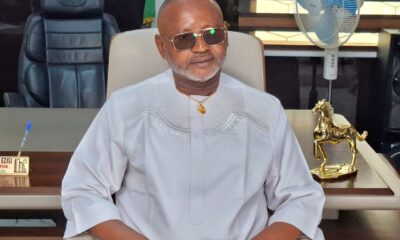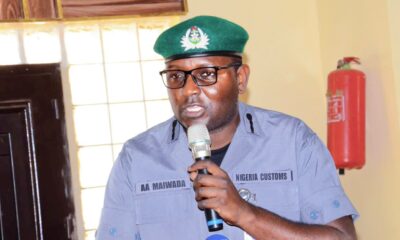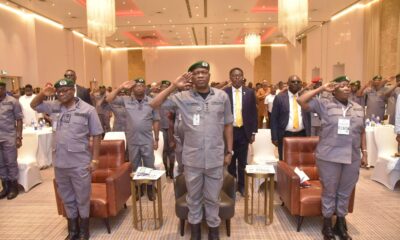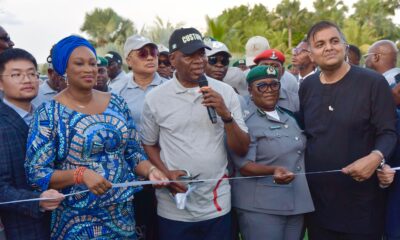Customs Report
Stakeholder Calls for Urgent Review of Nigeria Customs Act Over Rising Port Charges

BY GBOGBOWA GBOWA
A leading industry expert has raised alarm over what he describes as a deviation from international best practices in Nigeria’s port operations, calling for an urgent review of the Nigeria Customs Service Act 2023 and the multiplicity of charges imposed on importers and exporters.
Lucky Eyis Amiwero, a renowned customs and maritime consultant, in a letter addressed to President Bola Tinubu and other relevant authorities, criticized several provisions of the Nigeria Customs Service Act, particularly Section 18-(1)(a), which he says claims compliance with international standards.
According to Amiwero, this assertion is misleading when compared to Ghana’s model which he says is more transparent and accountable.
Aligning with Ghana’s benchmark reform model, Amiwero said the Ghana’s Export and Import (Amendment) Act 585 of 2000 clearly outlines destination inspection fees and allocates responsibilities and costs among customs services and platform providers.
He listed the underneath, clear variables under Ghana’s system:
*Importers pay inspection fees not exceeding 1% of the total dutiable CIF value.
*Customs receives 3% of total import duty and VAT collections.
*Platform providers are allocated 0.4%, ensuring accountability and cost transparency.
This structure, he argued, contrasts sharply with the supposed multilayered and often ambiguous fee system in the Nigerian model.
The letter also highlights Section 59-(30) of the Nigeria Customs Service Act 2023, which mandates that Non-Intrusive Inspection (NII) equipment and scanners be provided by terminal or warehouse operators—not the Nigeria Customs Service.
Amiwero stressed that Customs should not bear capital-intensive responsibilities that ultimately burden importers, manufacturers, and licensed customs agents, noting that it violates the WTO Trade Facilitation Agreement.

Amiwero who doubles as the National President and Member of the defunct Presidential Task Force On Reform of Nigeria Customs Service warned that Nigeria’s current fee structure contravenes Article 6 of the World Trade Organization’s Trade Facilitation Agreement (TFA), which stipulates that:
*Fees must reflect the approximate cost of services rendered.
*Charges should be closely connected to customs processing.
In the letter addressed to President Ahmed Bola Tinubu, Amiwero argued that Nigeria Customs now operates as a profit-driven entity, and allegedly imposing costs without government oversight, thereby undermining the Ease of Doing Business (EDB) initiative.
The letter further asserts that the Nigeria Customs Service Act violates key international conventions, including:
*The WCO Kyoto Convention, which promotes harmonization and simplification of customs procedures.
*The IMO/FAL Convention, which seeks to reduce costs and delays in maritime traffic.
Interestingly, Amiwero also claimed that customs agents and other players in the logistics value chain were not opportune to make participate in the Customs Act 2023 debate.
“The Nigeria Customs Service Act 2023, was never subjected to stakeholders/Public hearing at the Senate, the importance of Customs Act, which involve Import, Export, Manufacturing,(MAN) (NACCIMA), (LCCI) warehouse operators, Licensed Customs Agency(LCA), Bankers, Inland Revenue Service, Central Bank of Nigeria, Terminal operators, Aviation, Tourism, (PEBEC), Shipping Companies NAFDAC, SON etc. who will be directly impacted on the process, procedures and implication of cost, were excluded and avoided.
“The only Public Hearing that was done was at the House of Representative, which stakeholders identified various areas of concern at the hearing, and the sponsor of the bill later bypassed the Public hearing at the Senate with the various defects, that was severally rejected by the Presidency, which was later signed by the Buhari administration a month and few weeks to its exit.”
He called for the establishment of a committee of experts to review all port charges not tied to specific services, reorganize the inspection regime, harmonize and simplify port operations, and to minimize costs to make Nigerian ports more competitive within West and Central Africa.
He also urged the government to halt the proposed 4% Free-on-Board (FOB) charge on imports, warning that such measures would further inflate costs and discourage trade.
“We must act swiftly to align our port operations with global standards. The current system is unsustainable and detrimental to Nigeria’s economic growth,” Amiwero declared.

































